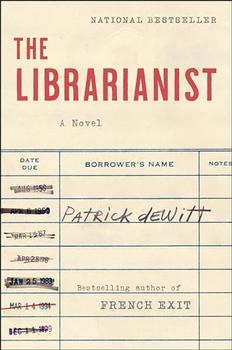Summary | Excerpt | Reviews | Beyond the Book | Readalikes | Genres & Themes | Author Bio

A Novel
by Patrick deWitt
He returned the Poe paperback to its place on the paperback shelf. He had been amassing books since preadolescence and there were filled shelves in half the rooms in the house, tidy towers of books in the halls. Connie, who had been Bob's wife, had sometimes asked him why he read quite so much as he did. She believed Bob was reading beyond the accepted level of personal pleasure and wondered if it wasn't symptomatic of a spiritual or emotional deformity. Bob thought her true question was, Why do you read rather than live?
As the day wore on, and Bob relived his experience at the center, he came to see it was not that he'd taken the task overseriously, but that he hadn't taken it seriously enough. He hadn't even preread the text. A cat is tortured and hung in the first pages of the story, and for some reason his appearance was unsuccessful! He telephoned Maria, explained why he'd failed, and told her he wanted to try again. Maria sighed a sigh that sounded like a no, but then she told him yes, all right, as you wish, and Bob spent the next six days preparing for his return. He put together a syllabus, a series of connected short stories and excerpts from longer works that he felt were of a piece thematically; he also wrote an introduction that illustrated his point of view. He wondered if he wasn't giving too much of his time to the project, but he couldn't stop himself, and didn't want to.
He slept poorly the night before his second reading and arrived at the center thirty minutes early, where the janitor again was muttering as he set up the chairs. Bob stood at the podium, readying himself, looking over his texts; Maria approached and asked if she might inspect Bob's books. He passed them over and she studied them one by one.
"Is Comet a Russian name?" she asked.
"No."
"But these books are all by Russians."
"That's true."
She passed the books back to Bob. "Do you read books by non-Russians?"
"Of course," he said. "I thought it could be fun for the group to try to identify the cultural through-lines and buried political opinion."
"Yes, that could be fun," said Maria. She obviously believed he would fail again, but wished him luck and went away. People began trickling in; there were not so many in the audience as before. Bob began with the prepared statement, which he had memorized.
"Why read at all? Why does anyone do it in the first place? Why do I? There is the element of escape, which is real enough—that's a real-enough comfort. But also we read as a way to come to grips with the randomness of our being alive. To read a book by an observant, sympathetic mind is to see the human landscape in all its odd detail, and the reader says to him or herself, Yes, that's how it is, only I didn't know it to describe it. There's a fraternity achieved, then: we are not alone. Sometimes an author's voice is familiar to us from the first page, first paragraph, even if the author lived in another country, in another century." Bob held up his stack of Russians. "How can you account for this familiarity? I do believe that, at our best, there is a link connecting us. A lifetime of reading has confirmed this for me. And this is the sentiment or phenomenon I want to share with you all today. I'm going to read some selections from the Russian canon. We'll be starting with Gogol—an obvious choice, but obvious for a reason. The language is a little formal, but the emotional information is, I think, relevant as ever."
Bob read "The Overcoat." He read in a clear, bright voice, and with a faith in the sideways beauty and harsh humor of the work. He knew that he could get through to these people if only they would give themselves to the words, but before he arrived at the text's halfway point they were shifting in their chairs. Soon they began to collect themselves, and then they did stand to go. By the time Bob completed the story the only people in the room were Chip and the muttering janitor, who had already begun the unhappy business of folding and stacking the chairs. As his muttering evolved to audible complaint, Bob learned the janitor blamed him for what he saw as needless busywork. Bob forbade himself from apologizing; he collected his books and made to leave, pausing to look down at Chip, who he now saw was soundly sleeping. Her sunglasses were crooked, and he corrected them. He walked past the long table in the Great Room, populated with people who had just left his reading; they were sitting side by side under softly buzzing fluorescent lighting, chatting, not chatting, doing crossword and Sudoku puzzles, cutting construction paper with safety scissors.
Excerpted from The Librarianist by Patrick deWitt. Copyright © 2023 by Patrick deWitt. Excerpted by permission of Ecco. All rights reserved. No part of this excerpt may be reproduced or reprinted without permission in writing from the publisher.
Your guide toexceptional books
BookBrowse seeks out and recommends the best in contemporary fiction and nonfiction—books that not only engage and entertain but also deepen our understanding of ourselves and the world around us.